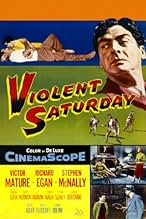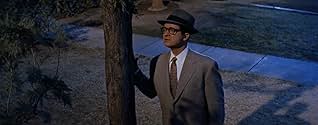NOTE IMDb
6,9/10
3,1 k
MA NOTE
Trois hommes font le repérage soigneux d'une petite ville, prévoyant de cambrioler la banque le samedi suivant, ce qui tourne au massacre.Trois hommes font le repérage soigneux d'une petite ville, prévoyant de cambrioler la banque le samedi suivant, ce qui tourne au massacre.Trois hommes font le repérage soigneux d'une petite ville, prévoyant de cambrioler la banque le samedi suivant, ce qui tourne au massacre.
- Réalisation
- Scénario
- Casting principal
Robert Adler
- Stan
- (non crédité)
John Alderson
- Amish Farmer on Train
- (non crédité)
Ellen Bowers
- Bank Teller
- (non crédité)
Virginia Carroll
- Carol, Martin's Secretary
- (non crédité)
Harry Carter
- Bart, Policeman
- (non crédité)
Avis à la une
Combination crime-drama and soap opera, presumably a contract picture from Fox with many familiar faces (and Ernest Borgnine inexplicably cast as an Amish farmer!), turns out to be a pretty exciting movie. Three hoods plot to stick up a small town bank; meanwhile, hormones are boiling over at the new copper plant where the foreman's son is drinking himself into a stupor while his cheating wife runs around on the golf course ("You're an alcoholic," she tells him, "and I'm a tramp!"). There's also a married banker who lusts after a shapely nurse, a librarian with sticky fingers, and Victor Mature as a graduate whose oldest child is ashamed that his father never served his country. Director Richard Fleischer sets up the pieces of this story almost sluggishly, yet after about an hour of exposition the plot really starts cooking. There are some strong images here, and vivid cinematography by Charles G. Clarke (with excellent location shooting in Bisbee, Arizona and terrific usage of De Luxe color stock). The ensemble cast works admirably together, no one person upstaging the other; however, crooked Lee Marvin makes a fantastic entrance into town stepping on a child's hand in the street! Gripping, tense, and surprisingly well-written, with Richard Egan getting an emotional monologue at the end about the unfairness of death. An injured Amish child is forgotten about in the rush of excitement, and Borgnine in an Abraham Lincoln beard strains credulity, but the technical aspects and direction of the film are top-notch. *** from ****
Three hoodlums plot to rob a bank in a small town. But the town has secrets of its own: The bank president is a Peeping Tom. The librarian is a petty thief. The son of the strip-mine owner is an alcoholic; his wife is openly carrying on an affair with the local golf pro. The son of the strip-mine foreman is ashamed of him because he didn't fight in Word War II. The strip-mine nurse is the object of several men's sexual fantasies.
With a great tough guy turn by Lee Marvin as one of the bank robbers, alternately sniffing an inhaler and stomping on kids' fingers, and Ernest Borgnine as an Amish farmer (!) who isn't completely pacifistic. (Inspiration for WITNESS?) The strip-mining is a wonderful metaphor for the secrets that lurk just underneath the surface of a seemingly placid small town. Would be good on a double bill with BAD DAY AT BLACK ROCK.
With a great tough guy turn by Lee Marvin as one of the bank robbers, alternately sniffing an inhaler and stomping on kids' fingers, and Ernest Borgnine as an Amish farmer (!) who isn't completely pacifistic. (Inspiration for WITNESS?) The strip-mining is a wonderful metaphor for the secrets that lurk just underneath the surface of a seemingly placid small town. Would be good on a double bill with BAD DAY AT BLACK ROCK.
The town of Bradenville is in for a Violent Saturday because three men, Stephen McNally, Lee Marvin, and J. Carrol Naish have come to town to rob their bank. McNally is the brains of the trio and for any number of reasons including the town's isolation, small police force, and the fact that the bank is open on Saturday until noon have made him determine this is the place for a stickup. He's even got a fourth guy Richey Murray staked out at an Amish farm holding the farmer Enest Borgnine and his family hostage, picked because of its isolation and the fact they have no electricity or modern communication to send up an alarm.
But this is some town Bradenville, while we see the bank robbers carefully timing out their job, we also get a glimpse of Bradenville's citizenry. Quite a little Peyton Place that town is.
Richard Fleischer as director managed to skilfully combine a soap opera and a crime caper film and it works. The script is very tight, not one frame of film is wasted. We get any number of interesting side stories in the 90 minute time of the film that do not detract in any way from the caper portion.
Victor Mature is the nominal hero of the piece, he gets carjacked and kidnapped, but proves to be a bit more than the robbers can handle. Ernest Borgnine stands out in the cast as the Amish father who has to question the pacifist tenets of his faith to protect his home and family.
A little bit of noir, a little bit of soap opera mixed very well in a good thriller of a film in Violent Saturday.
But this is some town Bradenville, while we see the bank robbers carefully timing out their job, we also get a glimpse of Bradenville's citizenry. Quite a little Peyton Place that town is.
Richard Fleischer as director managed to skilfully combine a soap opera and a crime caper film and it works. The script is very tight, not one frame of film is wasted. We get any number of interesting side stories in the 90 minute time of the film that do not detract in any way from the caper portion.
Victor Mature is the nominal hero of the piece, he gets carjacked and kidnapped, but proves to be a bit more than the robbers can handle. Ernest Borgnine stands out in the cast as the Amish father who has to question the pacifist tenets of his faith to protect his home and family.
A little bit of noir, a little bit of soap opera mixed very well in a good thriller of a film in Violent Saturday.
The wide-screen format was at most only two years old when this film was made. Yet, Charles G. Clarke's shot composition in the new wide-screen format is beautiful. This alone makes the film worth watching.
This is a good example of a color film noir; perhaps not as good as Niagara (1953) or Leave her to Heaven (1945), which were made by the same studio by the way (20th Century Fox), but still a good example from the noir cycle in color.
One way to understand film noir is that it is simply violent melodrama. Look at The Postman Always Rings Twice (1946) for example. Violent Saturday (1955) is steeped in melodrama, but there is also some extraordinary violence. And the violence here--in typical noir fashion--is the resolution--however bleak--to some of the melodramatic conflict.
The film has a profound cynicism grinding beneath the surface of the beautiful color photography. And this cynicism remains at the end of the film.
If you haven't seen this film and you are interested in film noir or film of this period, then I would highly recommend the Violent Saturday.
This is a good example of a color film noir; perhaps not as good as Niagara (1953) or Leave her to Heaven (1945), which were made by the same studio by the way (20th Century Fox), but still a good example from the noir cycle in color.
One way to understand film noir is that it is simply violent melodrama. Look at The Postman Always Rings Twice (1946) for example. Violent Saturday (1955) is steeped in melodrama, but there is also some extraordinary violence. And the violence here--in typical noir fashion--is the resolution--however bleak--to some of the melodramatic conflict.
The film has a profound cynicism grinding beneath the surface of the beautiful color photography. And this cynicism remains at the end of the film.
If you haven't seen this film and you are interested in film noir or film of this period, then I would highly recommend the Violent Saturday.
"Violent Saturday" was not an outstanding movie, nor very original, but that is not to say that it had no merit. Richard Fleischer's direction goes much farther than skin-deep. From one angle, "Violent Saturday" is about a hold-up and the normal guy (Victor Mature) who tries to stop the criminals. That's fine, and there are some very exciting moments toward the end of the film. But another angle is more interesting: it's a study of what normal small-town-folks do in secret. Indeed, in comparison to the unscrupulous dealings of a voyeuristic bank manager, a larcenous librarian, and a trampy wife and her alcoholic husband, the sadistic bad guys (including a memorable Lee Marvin) seem less sinister. In its studies of the dynamics between husband and wife, parent and child, and its Everyman hero and hard-bitten villains, "Violent Saturday" is half a tribute to noir tradition, half a fifties family-drama. The mixture is sometimes uneasy. Particularly annoying are the conversations between doofy dad Mature and his cute little son who wishes his dad was more of a hero. But the drama between the weirder citizens of the little town is intriguing. A masterful use of the camera and Hugo Friedhofer's strident score are other assets. All in all, "Violent Saturday" is worth a look.
Le saviez-vous
- AnecdotesThis was Victor Mature's final film for Fox, where he had been a contract player for 15 years.
- GaffesThe car is started and put into gear so that it will crash through the barn door after which the engine stalls but, while it's still in gear, Stadt and Martin are able to easily push it out.
- Citations
Mrs. Emily Fairchild: Would you like me to have you thrown out?
Linda Sherman: Why don't you get mad enough to try it. All I want is an excuse to pull that hair right out of your stupid head.
[Mrs. Emily Fairchild looks away]
Linda Sherman: Guess you don't have the guts.
- ConnexionsEdited into Verifica incerta - Disperse Exclamatory Phase (1965)
Meilleurs choix
Connectez-vous pour évaluer et suivre la liste de favoris afin de recevoir des recommandations personnalisées
- How long is Violent Saturday?Alimenté par Alexa
Détails
Box-office
- Budget
- 955 000 $US (estimé)
- Durée1 heure 30 minutes
- Couleur
- Rapport de forme
- 2.55 : 1
Contribuer à cette page
Suggérer une modification ou ajouter du contenu manquant

Lacune principale
By what name was Les inconnus dans la ville (1955) officially released in India in English?
Répondre

































